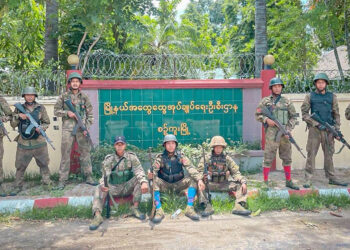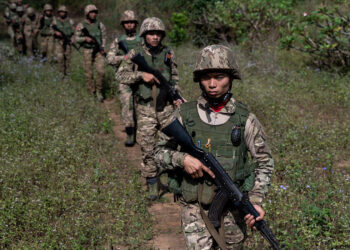The Restoration Council of Shan State (RCSS) has called for a ceasefire with its fellow Shan armed group the Shan State Progressive Party (SSPP), but the proposed truce does not extend to the Ta’ang National Liberation Army, the RCSS said.
The RCSS and SSPP have been fighting each other for over a year. More than 2,000 people in Hsipaw and Namtu townships have recently become internally displaced persons (IDPs) after fleeing the fighting. The clashes have resulted in a number of civilian casualties over the past year. The fighting has continued despite repeated pleas from prominent members of the Shan community including Buddhist monks and leaders of political parties.
This is the first time the RCSS has announced such a ceasefire, which includes an order to its ground troops to remain in their current positions and not to try and take more territory.
These RCSS and SSPP have repeatedly clashed over territory in northern Shan State, mostly in Namtu, Hsipaw and Kyaukme townships.
The RCSS issued a statement yesterday announcing the ceasefire. When contacted by The Irrawaddy RCSS spokesperson Colonel Sai Oo said it was too early to discuss details about how the ceasefire with the SSPP would be implemented.
His organization has not completed its internal discussions on the matter yet, he added.
He said the RCSS was announcing the ceasefire because the Shan people were suffering greatly due to the armed conflict. Many Shan had become IDPs, he said.
“We are calling the ceasefire because our people have lost a great deal of property due to the fighting,” he said.
The RCSS and SSPP have held meetings before, but they did not produce a lasting agreement. In previous talks, the SSPP asked the RCSS to return to its stronghold in southern Shan, where it has a headquarters in Loi Tai Lang. The RCSS refused. Early this month, the RCSS invited respected Shan leaders to a meeting at its headquarters in Loi Tai Lang for discussions on how to solve the armed conflict with the SSPP.
In its statement, the RCSS urged the SSPP to respect its ceasefire announcement. “We want them to maintain peace, stop fighting and protect our people’s property,” Col. Sai Oo said.
Colonel Sai Phone Han, a spokesperson for the SSPP, told The Irrawaddy on Friday that he could not comment other than to say that his organization would hold a meeting soon to discuss its response to the RCSS’s call for a ceasefire.
“It is good to stop fighting. But a ceasefire alone is not enough to solve the problem. Just saying pretty words is not enough. We need to talk about how we will settle our [conflict over] where our troops are based on the ground. And how we will resettle our IDPs,” Col. Sai Phone Han said.
The main problem is the territorial dispute between the two Shan armed groups, he said.
“Everyone has their own boundaries. Problems will always break out when someone comes to attack [the other side’s] land. We need to mark our boundary lines to be able to build trust in each other,” he said.
No ceasefire with the TNLA
Brigadier-General Tar Phone Kyaw, a spokesman for the TNLA, dismissed the RCSS’s ceasefire announcement, saying it had no meaning. The SSPP is sometimes joined by the TNLA during armed clashes with the RCSS.
Brig-Gen. Tar Phone Kyaw said the RCSS’s announcement had not affected the situation on the ground, with fresh clashes being reported on Friday.
He said leaders of the SSPP and TNLA believed that the RCSS’s latest action was just a political game, and that they did not believe the RCSS had any intention of ending its effort to grab territory from the SSPP and TNLA.

















